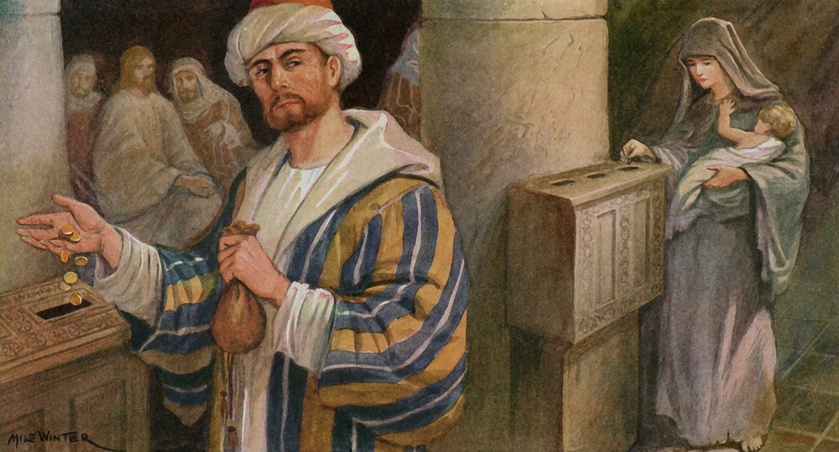From Damascus to Unity: Saul’s Radical Transformation and the Unifying Gospel
Acts 8:32-35
Now the passage of the Scripture that he was reading was this:
"Like a sheep he was led to the slaughter and like a lamb before its shearer is silent, so he opens not his mouth. In his humiliation justice was denied him. Who can describe his generation? For his life is taken away from the earth."
And the eunuch said to Philip, "About whom, I ask you, does the prophet say this, about himself or about someone else?"
Then Philip opened his mouth, and beginning with this Scripture, he told him the good news about Jesus.
The story unfolds in Acts 8:26-40, where Philip, one of the seven deacons chosen in Acts 6 and an evangelist filled with the Holy Spirit, is directed by an angel to travel a desolate road from Jerusalem to Gaza. There, he meets an Ethiopian eunuch; a high-ranking court official in charge of the treasury for Candace, the queen of Ethiopia (likely modern-day Sudan). This man, described as a eunuch (a castrated male often serving in royal households), had journeyed to Jerusalem to worship, indicating he was likely a Gentile convert to Judaism or a "God-fearer." On his way home, he’s reading aloud from the scroll of Isaiah in his chariot; a sign of his devotion and search for truth. This encounter isn’t random; it’s orchestrated by God. The Holy Spirit prompts Philip to approach the chariot, leading to a conversation that changes the eunuch’s life forever. It marks a key step in the gospel’s expansion beyond Jewish circles, fulfilling Jesus’ command in Acts 1:8 to witness "to the ends of the earth."
So, all this indicates that God and the gospel of Jesus Christ is sovereign and universal. Cross-cultural you could say. It's not purely Jewish, but is meant to be shared with all mankind.
In that age there was a great influence of Greek culture that permeated much of the known world. This is a byproduct of the conquests of Alexander The Great. So "the known world" was dominated by the Roman era but was influenced by Grecian culture. This Greek culture was more liberal arts than the Hebrew world. Therefore, there was a conflict between these peoples. And even closer to home, from within Israel's culture, there was this divide. The Sadducees were of the Hellenistic view (Greek), they were materialistic, pragmatic, they rejected the idea of the resurrection for instance. While the Pharisees followed the strict Hebrew tradition, the more fundamentalist views. Therefore, an evangelist who hoped to reach both these groups would need to have a great understanding of both these cultural traditions.
Enter in God's choice...
Acts 9:1-2
But Saul, still breathing threats and murder against the disciples of the Lord, went to the high priest and asked him for letters to the synagogues at Damascus, so that if he found any belonging to the Way, men or women, he might bring them bound to Jerusalem.
As we build on our journey through Acts; from Philip’s cross-cultural evangelism in chapter 8 to Saul’s escalating threats in Acts 9:1-2, today’s passage in Acts 9:3-6 captures one of the most transformative moments in Scripture: Saul’s encounter with the risen Jesus on the road to Damascus. God sovereignly chooses an unlikely figure, Saul of Tarsus, to bridge these worlds and propel the gospel forward.
Who was Saul?
Saul wasn’t just a passive observer; he was a zealous Hebrew Pharisee, "breathing threats and murder against the disciples of the Lord" (Acts 9:1), with a Hellenistic cultural history. Saul himself was a product of both worlds: Born in Tarsus, a Hellenistic city steeped in Greek culture, he was also a Roman citizen and trained under Gamaliel in Jerusalem (Acts 22:3, 27-28). This dual background made him uniquely equipped, though he didn’t know it yet, for God’s purposes.
God Chooses Saul - A Divine Encounter
Acts 9:3-6
Now as he [Saul] went on his way, he approached Damascus, and suddenly a light from heaven shone around him. And falling to the ground, he heard a voice saying to him, "Saul, Saul, why are you persecuting me?" And he said, “Who are you, Lord?" And he said, "I am Jesus, whom you are persecuting. But rise and enter the city, and you will be told what you are to do."
Notice that Jesus identifies himself with the Church, "why are you persecuting me?" This is important to understand, any persecution of the Church is counted against the persecuting parties by The Lord. He takes it personally quite literally. Jesus intimately identifies with His Church, counting any persecution against believers as a direct assault on Himself. And it's not unlike how Christ also sees the works of the Church, (see Matthew 25). In Matthew 25:31-46, Jesus declares that acts of kindness or harm toward "the least of these my brothers" are done unto Him. The Son of God sees both good works done by his children and wickedness done against them as works that are counted for or against him. He takes all of it very personally.
Saul, fueled by zeal, is en route to Damascus with authority to arrest followers of "the Way" (Acts 9:2). His mission is to eradicate what he sees as a heretical threat to Judaism, extending the persecution that scattered believers after Stephen’s death. Amid the cultural clashes mentioned earlier; Hellenistic influences versus Hebrew traditions, God sovereignly intervenes, choosing Saul, a zealous Pharisee with deep roots in both worlds, to bridge the divides and proclaim the universal gospel. But first God's going to need to get Saul's undivided attention.
A heavenly light, brighter than the noonday sun (Acts 26:13), envelops Saul, causing him to fall in awe and humility. And Jesus tells him he's not pleased. Saul thought he was defending God's sovereign power by targeting Christians, but Jesus clarifies: Attacking the Church is attacking Him. This underscores the mystical union between Christ the Head) and His body the Church.
1 Corinthians 12:27
"Now you are the body of Christ and individually members of it."
Christ literally sees believers as an arm and a leg. Paul (formerly Saul) is teaching that the Church is Christ’s living extension here on earth. Just as a body feels pain in its limb this mystical oneness means our experiences, suffering or service, are shared with Him. No member is insignificant, and harm to one affects the whole, and especially the Head.
How does that make you feel, knowing that God takes you so personally?
In the cultural clashes of the time, this truth was revolutionary. Hellenistic Jews like Stephen embraced a more inclusive faith, while traditionalists like Saul resisted. But Jesus’ revelation shatters these barriers. The gospel unites diverse "members" into one body, Jew and Gentile, Hebrew and Hellene. And Saul (later known as Paul) writes about this new reality Jesus is ushering in:
Ephesians 2:14-16
"For he himself is our peace, who has made us both one and has broken down in his flesh the dividing wall of hostility by abolishing the law of commandments expressed in ordinances, that he might create in himself one new man in place of the two, so making peace, and might reconcile us both to God in one body through the cross, thereby killing the hostility."
Jesus’ words cut to the core: "Saul, Saul, why are you persecuting me?… I am Jesus, whom you are persecuting". And he is changed forever by this encounter. It was a revelation of divine identity, intimate union, and a redemptive calling. Forever altered by this encounter, Paul emerges as the tireless apostle. There is a huge and complete transformation that takes place. In Saul’s context, persecuting Hellenistic Christians like Stephen (Acts 7) was an extension of the culture wars, defending pure Judaism against "liberal" Greek influences. The "heretics" he hunted were extensions of the false Messiah Jesus. Saul saw their teachings as a corrosive “liberal” influence eroding pure Jewish law and tradition. But he really despised the Hebrews who were throwing in with this Jesus movement. To him they were more than just heretics, they were insurrectionists, threatening the religious and social order, promoting a false Messiah. He despised Hebrews who joined the movement, viewing them as traitors to their heritage, worse than outsiders because they corrupted from within. Saul saw himself as a reformer, ravaging house churches, he saw his actions as a righteous purge.
The heavenly light and voice halt Saul in his tracks (Acts 9:3-4). Saul, once a fierce adversary, is forever altered by the divine light from Christ Jesus. "I am Jesus" affirms the resurrection; the very claim Saul rejected as heresy. This isn’t a dead false Messiah but the living Lord, echoing Yahweh’s "I AM" (Exodus 3:14) and forcing Saul to confront the divine reality he opposed.
Forever changed, Saul’s transformation is total: Blinded physically but enlightened spiritually, he emerges as Paul, authoring epistles that bridge Jewish law and Gentile grace, uniting both cultures in Christ. Now he's all about inclusivity. He's equally discerning and equally passionate, exhorting all the people. He argues from Scriptures with Jews and engages philosophers among the Greeks. And I think we can see this changed thinking best expressed in his letter to the church in Galatia.
Galatians 3:28
"There is neither Jew nor Greek, there is neither slave nor free, there is no male and female, for you are all one in Christ Jesus."
It's a radical shift in his ideology, ignited by his Damascus Road encounter. Once a divider fueled by his cultural zeal, persecuting Hellenistic Christians as heretics and Hebrews as insurrectionists, Paul now champions inclusivity with a discerning passion. He exhorts all people equally, arguing from the Scriptures with both Jews and Greeks.
Caution:
Paul isn’t advocating for a societal overhaul but for a spiritual reality. In the Church, these cultural distinctions must lose their divisive power. Saul, once passionate about exclusion, is now Paul, exhorting inclusivity with equal fervor, bridging the law and grace for all. Paul’s shift from cultural warrior to unifier challenges us amid our modern cultural divides; racial, political, or socioeconomic. Just as Paul did with Jews and Greeks, our churches must actively include "outsiders," arguing truth with discernment and engaging differing views with grace. If past prejudices linger, let Jesus’ words "cut to the core". Just know that whoever you love or hate for Christ's sake, you are loving or hating Jesus himself. Be sure to get it right. Think about what you do and say. Exhort with passion, but always toward unity in Christ.
Remember, the gospel isn’t "either/or" but "both/and" in Christ. It’s not about forced choices or exclusions but about reconciliation, inclusion, forgiveness, and harmonious unity through Jesus.
An "either/or" mindset views life, faith, or culture through binaries, opposites that can’t coexist. It’s a zero-sum game: One side wins, the other loses. Biblically, this echoes humanity’s fallen tendency toward division.
The gospel flips the script to "both/and," where seeming opposites are held together and redeemed in Jesus. It’s not compromise or relativism but a higher harmony where differences enrich rather than divide. You take the good and leave the bad. In Christ, both Jews (with their covenant heritage) and Greeks (with their philosophical depth) are fully included as equals. Both the law (as a tutor pointing to Christ) ...
Galatians 3:24
"So then, the law was our guardian until Christ came, in order that we might be justified by faith."
...And grace (as fulfillment in Him) coexist purposefully.
Ephesians 2:8-9
"For by grace you have been saved through faith. And this is not your own doing; it is the gift of God, not a result of works, so that no one may boast."
Paul becomes a "both/and" apostle. He bridges Jewish Scriptures with Gentile contexts. He's preaching from the prophets to Jews while engaging Greek thinkers on their terms. His epistles unite them both. Both circumcision and uncircumcision mean nothing now; what matters is a new creation. Both diversity and unity thrive in Christ.
Ephesians 4:4
"There is one body and one Spirit—just as you were called to the one hope that belongs to your call."
Just as Jesus embodies "both/and", both fully God and fully man, offering both justice and mercy. Salvation is both faith and works, not saved by works, but faith produces them. The gospel reconciles all things, turning "enemies" into "family." Not erasing the differences, but subordinating them to Christ, where they find purpose without conflict. It’s the gospel’s power to heal what sin tears apart.
We are called to proclaim a gospel that welcomes "both" sinners and seekers with the gospel truth, Jew and Greek alike, just as Paul did. Foster humility over dogmatism. Celebrate how different "both" groups contribute to the unified truth in Christ. Traditional wisdom and fresh perspectives. Sovereignty and free will, suffering and joy, all are resolved in Christ. The gospel doesn’t force false choices but redeems opposites in a higher harmony through Jesus.
Opposites like law vs. grace, Jew vs. Greek, justice vs. mercy are not subjected to compromise, instead the gospel of Christ heals them without erasing their value. It’s a divine synthesis where differences are subordinated to Jesus, enriching the whole. This "higher harmony" is God’s design for our fractured world, where differences enrich rather than divide, turning potential conflict into collaborative purpose. Saul/Paul is a perfect example of that transformation. he’s no longer “either/or” (Jewish purity over Greek “liberalism”); he’s using his dual heritage to unite them all in Christ.
Prayer:
Lord Jesus, king of the Universe, both God and Man, thank You for the gospel that reconciles opposites in Your redemptive harmony. Help us, like Paul, to bridge divides with humility, welcoming sinners and seekers into Your family. Subordinate our differences to You. Resolve our tensions, law and grace, suffering and joy, in Your perfect peace, and in your Holy name, Amen.




















